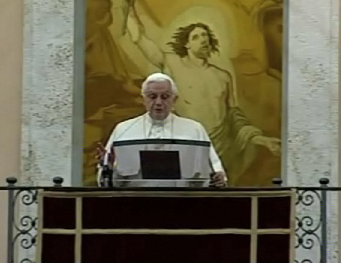SEARCH
 We could face today's problems "more serenely and effectively", said Pope Benedict XVI, if we reject "lies and violence in intentions, words and actions" and cultivate "sentiments of respect, understanding and esteem for others". On Sunday, the Holy Father delivered an exhortation for peace prior to the recitation of the Angelus. Included below is ZENIT's English translation of the Pope's address, preached at his summer residence in Castel Gandolfo.
We could face today's problems "more serenely and effectively", said Pope Benedict XVI, if we reject "lies and violence in intentions, words and actions" and cultivate "sentiments of respect, understanding and esteem for others". On Sunday, the Holy Father delivered an exhortation for peace prior to the recitation of the Angelus. Included below is ZENIT's English translation of the Pope's address, preached at his summer residence in Castel Gandolfo.
Today, for the customary Sunday reflection, I will take as my point of departure the passage from the Letter of James that is proposed to us by today’s liturgy (3:16-4:3), and I will pause, in particular, on an expression that is striking for its beauty and contemporary relevance. It has to do with the description of true wisdom that the Apostle contrasts with false wisdom. While the latter is "worldly, material and diabolical, and is recognized by the fact that it provokes jealousies, arguments, disorder and every kind of evil deed" (cf. 3:16), on the contrary "[true] wisdom, which comes from above is first of all pure, then peaceful, meek, docile, full of mercy and good fruits, impartial and sincere" (3:17). A list of seven qualities, according to the biblical custom, from which perfection of authentic wisdom comes along with the positive effects that it produces. As first and principal quality, almost the premise for the others, St. James sets down "purity," that is, sanctity, the transparent reflection -- so to say -- of God in the human soul. And, like God, from whom it comes, wisdom does not need to impose itself by force, because it has the invincible vigor of truth and love, that affirms itself. That is why it is peaceful, meek and docile; it does not need to be partial, nor does it need to lie; it is indulgent and generous, it is recognized by the good fruits that it bears in abundance. Read more...